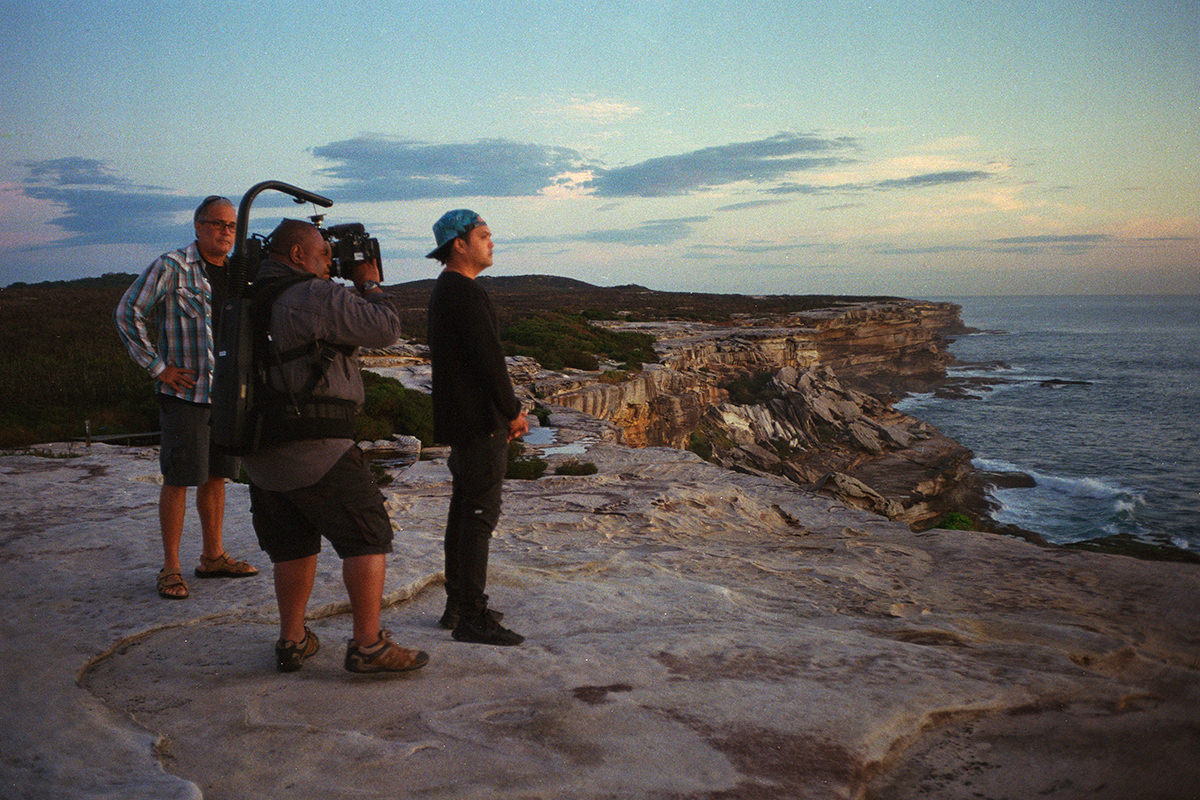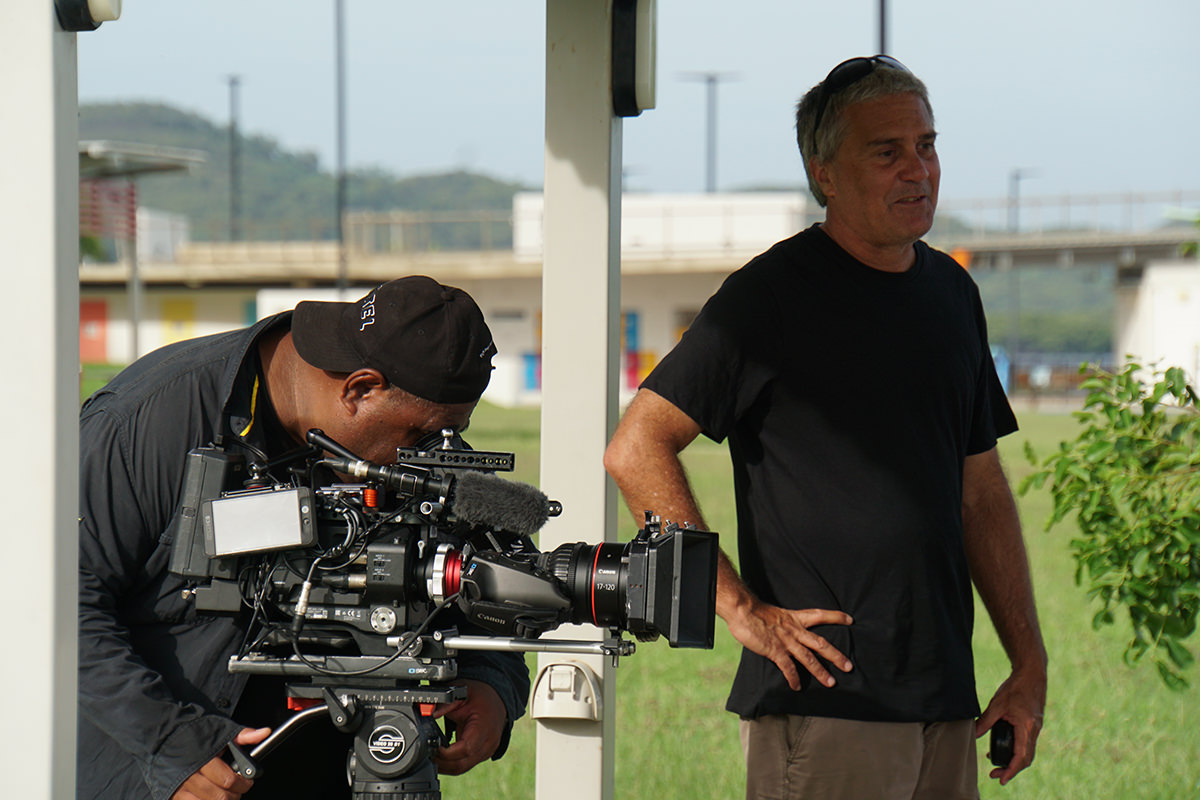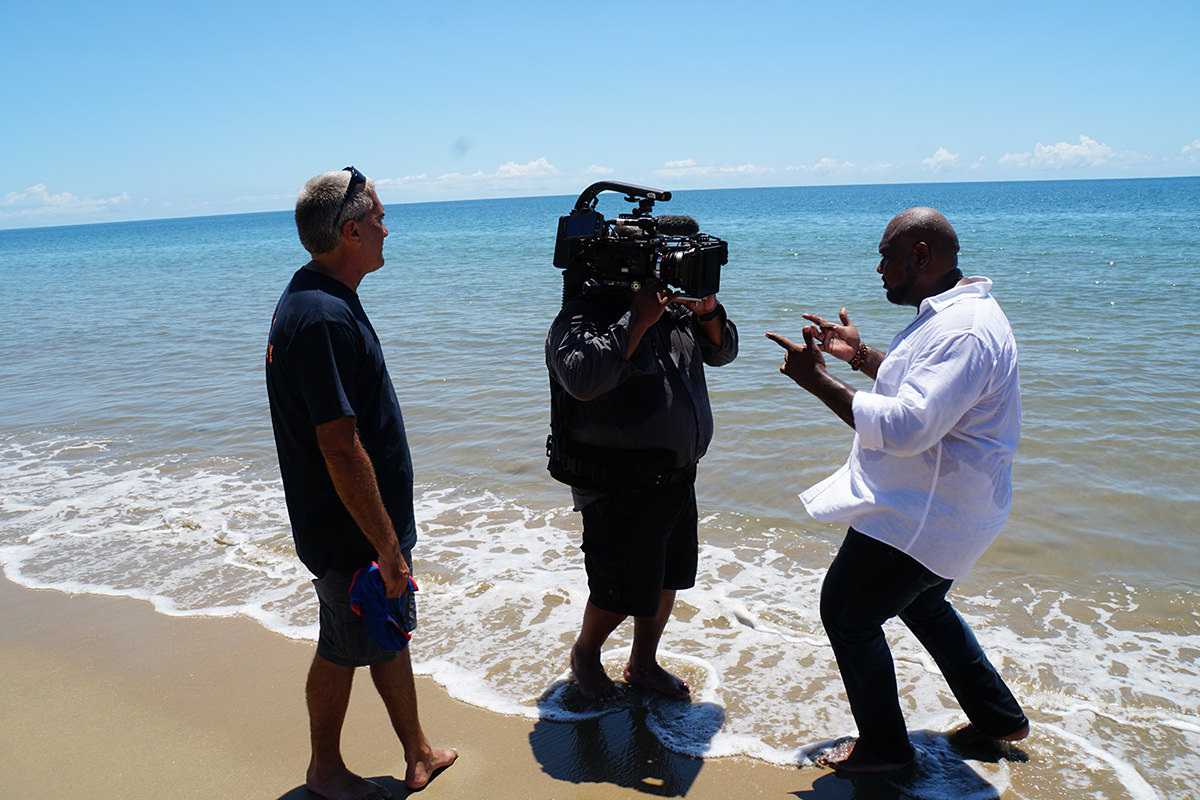Steven McGregor: Looky Looky Here Comes Cooky
The co-writer behind Sweet Country and Mystery Road and director on the likes of Black Comedy, on how to make a documentary when time and travel are against you.
 Steven McGregor, Murray Lui and rapper Birdz filming Looky Looky Here Comes Cooky
Steven McGregor, Murray Lui and rapper Birdz filming Looky Looky Here Comes Cooky
Steven McGregor always knew Looky Looky Here Comes Cooky would present some challenges. But perhaps not as many as they had to overcome.
Directed by McGregor, who co-wrote the documentary with producer Danielle MacLean and comedian Steven Oliver, it presents a fresh First Nations perspective on Captain Cook.
“[This year] was a 250th anniversary of Cook [and] we felt there was no point of view from an Indigenous perspective. So Danielle MacLean, one of the producers, it was her initial idea,” McGregor says.
“But rather than get a bunch of academics and make it sterile, we wanted to make it a bit more palatable. So basically, the brief was it was a subversive history lesson. And we landed on music as a way to tell a story and effect people without them realising it until a bit later.”
Steven Oliver in Looky Looky Here Comes Cooky
What they created with Looky Looky Here Comes Cooky, along with a host of Indigenous singer/songwriters, is a new songline for 21st century Australia, which will make its world premiere at the Melbourne International Film Festival on 16 August before being simulcast on NITV and SBS VICELAND on 20 August.
The documentary travels along the eastern coastline of Australia, telling the history through a combination of interviews, archival images, stunning landscapes (shot by DOPs Murray Lui and Leuke Marriot), and the songs from voices including A.B. Original co-founder Trials, rapper Birdz, Mo'Ju, Alice Skye, Mau Power, Fred Leone, and Kev Carmody.
Guiding the audience on this journey is comedian Steven Oliver (Black Comedy), who also delivers a series of powerful slam poetry moments.
“The perfect person to lead an audience through all of that is Steven Oliver,” McGregor says. “He can say something and you don't realise he's getting under your skin til later. So rather than stand on a soapbox and preach, I think Steven's ability to engage an audience just for being him allows a stronger and bigger message to get through.”
Once they got the greenlight for the idea, they were off and running immediately. The very nature of the story meant they would need to release Looky Looky Here Comes Cooky in 2020 – the anniversary year of Captain Cook’s landing in Botany Bay.
“It was a total mad race,” McGregor says.
“We started shooting in January and we were sort of aiming for NAIDOC Week airdate in June on NITV, so we were madly scrambling with the shoot.”
It was already a rush, “but then COVID hit.”
 Murray Lui and Steven McGregor filming Looky Looky Here Comes Cooky
Murray Lui and Steven McGregor filming Looky Looky Here Comes Cooky
There was meant to be four blocks of filming, but only ended up doing three blocks. NAIDOC Week was also pushed back to 8-15 November because of COVID-19.
“So we couldn't do the fourth block of filming, and I was in Melbourne cutting. And then the Northern Territory borders were about to close and I live in Darwin, so I [had to come] back to Darwin.”
With the editor still in Melbourne, McGregor says they cut most of the feature over Zoom.
“That was a big headache. But we basically had the big structure down before I'd left Melbourne and Bill Murphy the editor, I've worked with him before and he's amazing.
“So we would talk in the morning, we'd look at the cut and then I'd give him notes, and we'd catch up again in the afternoon and go through it. It's not an ideal way to work. I don't want to do that again.
“And then also we had to do the grade and a sound mix remotely as well. So we had everything thrown at us, but you get through it.”
Now, Looky Looky Here Comes Cooky has been selected to screen as part of MIFF 68 ½ - a digital film festival for 2020 available not just in Melbourne, but to stream across Australia.
McGregor says a part of him will miss sitting with an audience for the “exhilarating and totally terrifying” experience of a world premiere in a cinema, “but in the same respect, online opens it up to a bigger audience so that's a good thing too.”
For those watching the documentary for the first time, McGregor hopes people can have a laugh and a dance, but also think about what it’s really saying.
“The biggest thing is [the idea] that Cook discovered Australia – Australia was already here, people were already here, there were systems of governance and law that was already here.
“Just consider that. Have the conversation, I suppose. Because I mean, it has been a pretty one-sided conversation for a long time. We want to be part of the conversation.”
Read on to hear in McGregor’s own words, the journey of piecing together the story and music of Looky Looky Here Comes Cooky, his writing process, how his approach to documentary and drama differ, and his advice for other writers and directors:
Did bringing in the musical element – where original songs from different voices and styles were composed to make the songline – make it tricky?
Absolutely, it was very challenging. The approach was to get as many fresh voices writing those musical pieces and they were given a brief to write: they all wrote from the point of view of a character. And then music producer Daniel Rankine (A.B. Original co-founder Trials) shaped the music. I would get the lyrics and I'd make some suggestions, but I'm not a musician so I was very respectful that it was their music and their voice and whatever input I had was very subtle and just to help with the narrative of the film overall. But they were really receptive. They invested wholly into the story we wanted to tell, which was exciting. And it was a good experience, watching it all come together.
How did you, Danielle MacLean and Steven Oliver approach the writing?
Danielle and Steven got together first in the writers' room and the initial idea was put on the page. And then it was Danielle, Steven and I for a couple of days, and then it was just me and Steven for about a week in Sydney working it out, doing some of the poetry, how it was going to start, where did we want it to go. And then it was just a bit of back and forth between me and him and we were refining it as we were shooting.
 Behind the scenes of Looky Looky Here Comes Cooky
Behind the scenes of Looky Looky Here Comes Cooky
You’ve co-written on multiple titles including feature films like Sweet Country (with David Tranter) – what do you enjoy about that approach?
I like working in the collaborative space. Putting our heads together and working it all out together. Some things you work on individually because you have a certain voice, but for this it worked perfectly. Danielle, Steven and I all coming at it with our different strengths and then shaping the story as a whole, I think worked really well. Steven has a unique point of view on the world and is able to subvert a lot of politics and it's just about containing that and shaping that and getting it into a strong narrative. It was Steven's first doco so he was very apprehensive and to his credit he was very trusting in us and the film crew. We travelled the country and talked to a lot of people. Steven being so liked and well-received gave us a smoother ‘in’.
What’s your writing process?
My approach is a minimum of five pages a day. And if I get to do more than that, that's a bonus. Sometimes I'll get 13. I try to be disciplined. I always try to start by 9am and finish by 3pm or 4pm, unless I've got a screaming deadline, which pushes me further. Sometimes I'll start at 5am and finish at 12pm, working really early in the morning. You can get a lot done when there's no interruptions. I can't write out at night, it does my head in.
I'm not a big user of [scene] cards. No white board. I just sit there and stare off at the wall. Sometimes I'll scribble on a pad. I just chuck it all on the page and then I'll sort through it. Mostly there's something there.
Does your approach change from documentary to a scripted TV or film?
Well I always look for a dramatic structure or a dramatic arc. And I try to break up the story into acts. So I always come to it from a dramatic point of view. I haven't always done that, but I've just learnt that over time I suppose because I've done a lot more writing. With documentary, there's a certain aspect where you don't know what's going to happen, but with this film we had a pretty good idea of how it was shaped. So we had our three acts and where we wanted the turning points. But once you get in the edit room that can change. I think my dramatic background does inform the docos, for sure. And vice versa. My docos inform my dramatic work.
What’s your favourite part of the process?
I really like shooting, but I suppose the edit. I really like the edit when all the elements are coming together and you see what you've captured become the story.
I suppose I should throw writing in there as well, but I love it and hate it.
Any advice?
As a writer you just got to put it on the page. And I think there's a lot of support out there at the moment in terms of state film bodies and Screen Australia, so it's about tapping into those resources and tapping into networks. And technology is so available now that you can shoot a film on iPhone and upload it to YouTube. It's just about practicing and practicing that craft.
Looky Looky Here Comes Cooky will make its world premiere at the Melbourne International Film Festival on Sunday, 16 August. It will then be simulcast on NITV and SBS VICELAND on Thursday, 20 August at 8.30pm.

What to read next
Hear from Australian TV screenwriters at the top of their game including Sarah Lambert, Stephen McGregor, Mithila Gupta, Elise McCredie and more.
15 Jan 2020
Caris Bizzaca